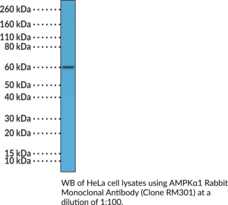Territorial Availability: Available through Bertin Technologies only in France
- Correlated keywords
- AMP-K?1 intra cellular LK B1 immuno histo chemistry immunohisto histochemistry
- Product Overview:
AMP-activated protein kinase ?1 (AMPK?1) is a subunit of AMPK, a serine/threonine kinase that acts as a metabolic sensor to maintain cellular energy homeostasis.{59689} AMPK is a heterotrimeric complex composed of a catalytic ? subunit and ? and ? regulatory subunits, where each subunit has multiple isoforms encoded by different genes, forming up to 12 distinct heterotrimers. The ? subunit has two isoforms, ?1 and ?2, encoded by PRKAA1 and PRKAA2, respectively, in humans. AMPK?1 is ubiquitously expressed and contains an N-terminal kinase domain that is subject to phosphorylation, a modification required for its activation, as well as an auto-inhibitory domain connected to the C-terminal domain by a flexible ?-linker that associates with the ? subunit and regulates AMPK activity.{59689,59690} Under conditions of low intracellular ATP, such as hypoxia or nutrient deprivation, AMPK?1 is phosphorylated by liver kinase B1 (LKB1), leading to AMPK?1 activation and alterations in several key metabolic processes that restore energy homeostasis.{59691} AMPK?1 activation inhibits anabolic processes, such as glucose, lipid, or protein biosynthesis, activates catabolic processes, such as glycolysis, lipolysis, and autophagy, and stimulates mitochondrial biogenesis and lysosomal degradation. Cayman’s AMPK?1 Rabbit Monoclonal Antibody can be used for immunohistochemistry (IHC) and Western blot (WB) applications.
Cayman Chemical’s mission is to help make research possible by supplying scientists worldwide with the basic research tools necessary for advancing human and animal health. Our utmost commitment to healthcare researchers is to offer the highest quality products with an affordable pricing policy.
Our scientists are experts in the synthesis, purification, and characterization of biochemicals ranging from small drug-like heterocycles to complex biolipids, fatty acids, and many others. We are also highly skilled in all aspects of assay and antibody development, protein expression, crystallization, and structure determination.
Over the past thirty years, Cayman developed a deep knowledge base in lipid biochemistry, including research involving the arachidonic acid cascade, inositol phosphates, and cannabinoids. This knowledge enabled the production of reagents of exceptional quality for cancer, oxidative injury, epigenetics, neuroscience, inflammation, metabolism, and many additional lines of research.
Our organic and analytical chemists specialize in the rapid development of manufacturing processes and analytical methods to carry out clinical and commercial GMP-API production. Pre-clinical drug discovery efforts are currently underway in the areas of bone restoration and repair, muscular dystrophy, oncology, and inflammation. A separate group of Ph.D.-level scientists are dedicated to offering Hit-to-Lead Discovery and Profiling Services for epigenetic targets. Our knowledgeable chemists can be contracted to perform complete sample analysis for analytes measured by the majority of our assays. We also offer a wide range of analytical services using LC-MS/MS, HPLC, GC, and many other techniques.
Accreditations
ISO/IEC 17025:2005
ISO Guide 34:2009
Cayman is a leader in the field of emerging drugs of abuse, providing high-purity Schedule I-V Controlled Substances to federally-licensed laboratories and qualified academic research institutions for forensic analyses. We are certified by ACLASS Accreditation Services with dual accreditation to ISO/IEC 17025:2005 and ISO Guide 34:2009.





